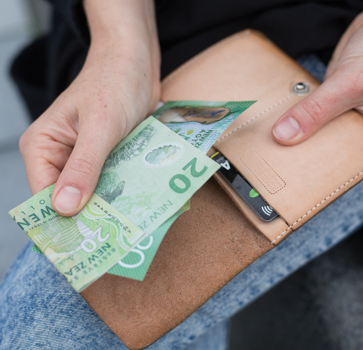Automatic guarantees when buying from a business
Introduction
The Consumer Guarantees Act 1993 gives you some automatic guarantees whenever you buy goods or services from a business for personal or household purposes.
Who is a consumer?
You are a “consumer” when you buy goods or services from a business and you’re using them for personal or household purposes. This means that you are protected by the Consumer Guarantees Act.
If you buy something that isn’t ordinarily used for your personal or household use – for example, a photocopier – you are not protected by the Act.
If you receive goods as a gift from the person who bought them, you have the same rights against the trader (who sold you the good) and the manufacturer as if you bought the goods yourself.
Who is a “trader” under the Consumer Guarantees Act?
The Consumer Guarantees Act applies to businesses or individuals who are in the business of trading (called a “trader” in this chapter).
These factors suggest that someone is a trader:
- they regularly sell goods or services
- they make or buy goods with the intention of selling them
- they are GST registered
- they have staff to help with sales
- they have a limited liability company.
Can a trader decide not to be covered by the Consumer Guarantees Act?
Consumer Guarantees Act 1993, s 43
No. If you’re buying goods or services for personal or household purposes, you will be covered by the Consumer Guarantees Act, regardless of what the trader tells you or what’s in the contract.
A trader can’t decide that the Act doesn’t apply to them, or ask you to sign a contract saying that the Act doesn’t apply (sometimes called “contracting out”).
If a trader tries to contract out of the Act (for example, by displaying signs such as “No refunds”), they are committing an offence under the Fair Trading Act 1986 by misleading consumers about their rights. They can be fined (see: “Protections against misleading or unfair trading”).
You and the trader together can agree to contract out of the Act, but only if:
- you’re both making the transaction for business purposes, and
- the agreement to contract out of the Act is in writing, and
- given the context (including the value of the goods and service, any difference in bargaining power, whether you both had a lawyer or not) it’s fair and reasonable for both of you to be bound by the agreement.
Are the rules the same when you buy online?
Yes – buying online is treated the same as any other sale. You’ll still be protected by the Fair Trading Act and the Consumers Guarantees Act.
This includes sales from “traders” on Facebook Marketplace and other social media, auction sites like Trade Me, websites and text messaging. They must disclose their trader status online.
If you buy from a New Zealand business and the goods are faulty, you can get refunds, repairs or replacements under the Consumer Guarantees Act.
If you purchased the goods using a debit or credit card online and your goods don’t arrive, you can ask your bank to reverse the payment (“chargeback”).
Are the rules the same if you buy from an overseas business?
The Consumer Guarantees Act might still apply if you buy from an overseas business, but it becomes much more difficult to resolve issues and enforce your rights.
Where can I go if I want to complain?
First, you should contact the trader and see if you can resolve matters. Some businesses, like Trade Me, have a dispute resolution process available. Otherwise, you can go to the Disputes Tribunal or the Commerce Commission if there were false or misleading misrepresentations made.
Tips for handling consumer problems
- Write down a summary of everything that happened.
- Gather together any relevant evidence (including photos, paperwork, receipts, invoices, quotes, contracts, messages, or agreements.
- Contact the trader and see if you can resolve the dispute. Some businesses, like Trade Me, have a specific dispute resolution process available.
- Explain what is wrong with the goods or services and what remedy you want, for example, a replacement or a refund.
- Ask for a response by a certain date.
- If you can’t resolve it, you could escalate to the manager or owner.
- If you can’t resolve the problem with the trader, consider taking the complaint to the Disputes Tribunal (see: “The Disputes Tribunal”).
- If the trader made false or misleading statements, you can inform the Commerce Commission (see: “Enforcing the rules against misleading or unfair conduct”).

